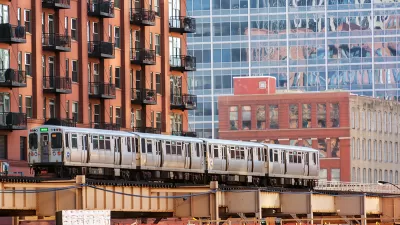The new funding criteria established for the expansion of the U.S. Department of Transportation's popular TIFIA loan program may make it easier for projects such as the infamous "bridge to nowhere" to secure financing.
The Fiscal Times' Josh Boak reports on the new rules established by the federal transportation bill for the rapidly expanding, and increasingly important, TIFIA (Transportation Infrastructure Finance and Innovation Act) credit loan program. "A project's potential economic benefits are no longer among the standards for awarding loans and loan guarantees, which will now be decided primarily by creditworthiness. And applicants must now be considered on a first-come, first-served basis, instead of competing against each other for a pool of money that Congress has increased tenfold to $1.7 billion for the next two years."
Some worry the change ceded too much of the Administration's control over the program in granting projects with a better ability to pay back loans first dibs at TIFIA financing. This will allow projects like self-financing toll roads to take preference over mass-transit, changing the way the federal government prioritizes transportation projects.
"Critics note that the government might no longer be able to get the biggest bang for its buck," reports Boak. "Federal officials would disburse loans to state and regional authorities that got their applications to the government the fastest, rather than to programs that could do more to fuel economic growth." Still, supporters of the changes hope they will help to jumpstart financing for construction and make the program more responsive to applicants.
FULL STORY: New Law Puts "Bridge to Nowhere" Back on Track

Planetizen Federal Action Tracker
A weekly monitor of how Trump’s orders and actions are impacting planners and planning in America.

Map: Where Senate Republicans Want to Sell Your Public Lands
For public land advocates, the Senate Republicans’ proposal to sell millions of acres of public land in the West is “the biggest fight of their careers.”

Restaurant Patios Were a Pandemic Win — Why Were They so Hard to Keep?
Social distancing requirements and changes in travel patterns prompted cities to pilot new uses for street and sidewalk space. Then it got complicated.

Maui's Vacation Rental Debate Turns Ugly
Verbal attacks, misinformation campaigns and fistfights plague a high-stakes debate to convert thousands of vacation rentals into long-term housing.

San Francisco Suspends Traffic Calming Amidst Record Deaths
Citing “a challenging fiscal landscape,” the city will cease the program on the heels of 42 traffic deaths, including 24 pedestrians.

California Homeless Arrests, Citations Spike After Ruling
An investigation reveals that anti-homeless actions increased up to 500% after Grants Pass v. Johnson — even in cities claiming no policy change.
Urban Design for Planners 1: Software Tools
This six-course series explores essential urban design concepts using open source software and equips planners with the tools they need to participate fully in the urban design process.
Planning for Universal Design
Learn the tools for implementing Universal Design in planning regulations.
Heyer Gruel & Associates PA
JM Goldson LLC
Custer County Colorado
City of Camden Redevelopment Agency
City of Astoria
Transportation Research & Education Center (TREC) at Portland State University
Camden Redevelopment Agency
City of Claremont
Municipality of Princeton (NJ)




























